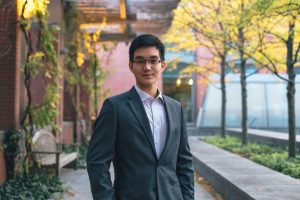Electrical Engineering Major
The broad umbrella of Electrical Engineering (EE) is involved in some part in almost all modern day technological advances and products in areas ranging across telephony, mobile and satellite communications, fiber optics, electrical power and machinery, instrumentation, computer systems, satellite systems, microelectronics, robotics, graphics, automatic control, and telecommunications to name but a few. The Electrical Engineering major is a flexible, broad-based program that provides a rigorous grounding in the analytical and experimental foundations of electrical engineering while allowing a student substantial flexibility in crafting an individualized program reflecting his or her interests and career goals.
What is Electrical Engineering?
Electrical engineering (EE) connects the physical world with the information world.
Electrical engineers can apply physics and chemistry in modern nanotechnology devices, can encode and manipulate information in circuits and networks, and can mathematically understand and reason with large amounts of data in real time. This makes electrical engineering one of the broadest forms of engineering, resulting in very broad set of possible careers. The societal impact of electrical engineering can be found in numerous domains, ranging from smartphones, to 4G wireless, to medical imaging, to electric as well as driverless cars, to the internet of things.
EE includes the engineering of electrons, magnets, photons, electro-magnetic waves, quantum states, and electro-mechanical structures. Electrically Engineered systems provide communication, sensing, actuation, display, storage, conversion, control, and computation. EE’s have given us audio and video capture, processing, storage, transmission, and reproduction, wireless, wired, and optical communications, gigabit and terabit data storage systems, gigahertz processors, radar, microwaves, micro- and nano-fabrication, medical sensing, ultrasound, MRI, personal health monitoring, autonomous robot control, solar cells and energy harvesting, LCDs, flat screens, and projection displays. The EE discipline includes both the design and implementation of physical realizations (devices, circuits, antennas) and the mathematical tools for optimizing the exploitation of these systems (control theory, information theory, digital logic, signal processing).
Electrical Engineering (EE) Degree Requirements
All candidates for a Bachelor of Science in Engineering (B.S.E.) degree are required to satisfactorily complete a minimum of 40 course units. (A lecture or laboratory course meeting three or four hours a week typically carries one course unit. Some courses carry more than one course unit; examples include lecture courses with a substantial laboratory component.) These course units (also know as CU’s) are distributed amongst the following six categories: Mathematics, Natural Sciences, Engineering, Other Electives, Social Sciences & Humanities, and Free Electives. The specific academic program of the student has to meet general University and accreditation guidelines and is determined in consultation with the student’s academic advisor. View Requirements & Sample Curriculum | Concentrations
Student Testimonials
 Johnathan Chen
Johnathan Chen
Class of 2019
“Electrical Engineering at Penn can easily be thought of as “The Umbrella Major.” It encompasses so many diverse subjects, allowing students to either specialize in one particular field or receive a broad understanding of different disciplines. The curriculum is structured so that students take the introductory courses in Circuitry, Nanosystems, and Decision Systems; afterwards, they’ll have the vocabulary and knowledge to determine whichever career path they are interested in while having a base understanding of all fields in EE. It’s a major that offers flexibility and depth, a true rarity.”
Read Johnathan's Story
Why EE at Penn?
Electrical Engineering at Penn can easily be thought of as “The Umbrella Major.” It encompasses so many diverse subjects, allowing students to either specialize in one particular field or receive a broad understanding of different disciplines. The curriculum is structured so that students take the introductory courses in Circuitry, Nanosystems, and Decision Systems; afterwards, they’ll have the vocabulary and knowledge to determine whichever career path they are interested in while having a base understanding of all fields in EE. It’s a major that offers flexibility and depth, a true rarity.
What would you say is your favorite EE class?
My favorite Electrical Engineering class would have to be ESE 111. This may come as a surprise to some, since it is the most basic class Penn’s ESE department offers, but Dr. Dan Lee and Mr. Siddarth Deliwala are phenomenal professors and mentors. They really inspired me to explore the wonders of the major. Furthermore, the final project is an incredibly creative assignment that offers students much leeway to design whatever they want. I ended up building a motorized camera slider that allows users to capture motion time-lapses, something that costs more than $1000 in industry. It was my first ever real engineering project, and I developed a true appreciation for EE.
How would you describe EE to friends or family who aren’t familiar with it?
A long time ago, a crazy guy with a slightly-too-large forehead wondered what lightning was and if we could harness its energy. In pursuit of his curiosity, he ended up flying a kite with a key on it through a thunderstorm and electrocuting himself. Because of this (somewhat idiotic) experiment, I can communicate this bloated story about our beloved founder, Ben Franklin, to you no matter how far away we are from each other. I think people take feats like this for granted. Man’s ability to harness nature is what makes it exciting to be alive. As electrical engineers, we are at the frontier of invention and innovation: we manipulate the world to build tomorrow we want, today.
What do you think it takes to be a “successful” electrical engineer?
Grit. Plain and simple: electrical engineering is not easy. Software engineers at least have tools to debug their programs. Debugging hardware is ever more intricate. You have to have a thorough understanding of your project, and copying/pasting errors onto Stack Overflow won’t always work. Of course, the more difficult something is, the more rewarding it becomes. Successful electrical engineers persevere in times of hardship. The most interesting part? If you do your job perfectly, no one should notice your work. The hallmark of a great engineer is his invisibility. The product functions so well that the inventor who created it disappears.
What other activities do you participate in at Penn?
I spend most my time working in Penn Electric Racing, a team that designs and builds an electric vehicle from scratch every year. We race our cars competitively at FSAE Electric in Lincoln, Nebraska every year. It’s an immensely rewarding club that allows me to apply concepts I have learned in class on real-world engineering projects.
 Adam Zachar
Adam Zachar
Class of 2017
“I’ve always enjoyed the intersection of physics (how the world works) and engineering (how we can shape the world in a useful way), which makes the applied physics classes at Penn perfect for me. Penn’s Electrical Engineering major is extremely flexible, and I’ve been able to shape my degree around some of my favorite classes on campus.”
Read Adam's Story
I’ve always enjoyed the intersection of physics (how the world works) and engineering (how we can shape the world in a useful way), which makes the applied physics classes at Penn perfect for me. Penn’s EE major is extremely flexible, and I’ve been able to shape my degree around some of my favorite classes on campus:
Sophomore Year:
Electric and Magnetic Fields (ESE 310)
Analytical Mechanics (PHYS 351)
Junior Year:
Physics and Models of Semiconductor Devices (ESE 321)
Quantum Mechanics I & II (PHYS 411 & 412)
Quantum Engineering (ESE 523)
Senior Year:
Nanoscale Science & Engineering (ESE 525)
Nanofabrication Lab (ESE 522)
The department’s flexible requirements have allowed me to explore other branches of engineering (especially mechanical and chemical) or even natural sciences in the College of Arts & Sciences.
Outside of class, I am Co-Director of the Penn Aerospace Club [http://pennaero.com/]. We launch physics experiments to the edge of space on high altitude balloons, certify our members to launch rockets, and build our own custom RC aircraft. I co-founded the club my freshman year, and Penn ESE has been incredibly supportive of our work.
To combine my interests in outer space and nanodevices, I’m submatriculating into a Masters in Electrical Engineering, with a thesis focused on nanofabrication equipment optimized for the space environment.
 Catherine Yee
Catherine Yee
Class of 2017
“To be a successful electrical engineer, it takes a special blend of wanting to understand how electrical systems work in the real world, willingness to roll up your sleeves and work hard, and not being afraid to ask for help. I’ve spent many late nights in Detkin Lab working on EE projects, but I’ve also formed some of my strongest friendships at Penn through ESE.”
Read Catherine's Story
EE at Penn encourages learning by doing. The curriculum is very hands on and students regularly have the opportunity to apply theoretical concepts to real, practical applications. The staff is approachable, friendly, and very engaged with undergrads. Penn Engineering also offers an amazing submatriculation program. I’ll be finishing my Bachelor’s and Master’s degree in 5 years.
My favorite EE classes were ESE 215 because it sparked my excitement about circuits, and ESE 350 because it allowed me to apply my skills in embedded systems to make a really cool project.
To me, EE is what establishes the connection between physics and the technology that people interact with in their daily lives. If you’re curious about how the circuitry in your laptop works, how transmission lines transmit power, or how wireless signals connect people across the globe, EE is for you.
To be a successful electrical engineer, it takes a special blend of wanting to understand how electrical systems work in the real world, willingness to roll up your sleeves and work hard, and not being afraid to ask for help. I’ve spent many late nights in Detkin Lab working on EE projects, but I’ve also formed some of my strongest friendships at Penn through ESE.
I’ve interned for two summers at Intuitive Surgical – the company who produces the da Vinci Surgical System. I’ve worked both in Sustaining Engineering and in New Product Development.
I competed for Penn Swimming as a D1 breaststroke and sprint freestyle swimmer for four years. I also participated in Alpha Omega Epsilon – social/professional sorority for women in engineering and technical science, taught volunteer swimming lessons for underserved kids in Philadelphia with We Can Swim, and TA’d several ESE classes. This year, I am TA-ing ESE senior design and GA-ing in Rodin College House.
 Simon Oh
Simon Oh
Class of 2018
“Electrical engineering at Penn meets all the requirements of an ideal engineering community. First, we have a team of world-class faculty, complemented by a very supportive department that organizes a great suite of department-specific events. Then we have a vibrant student body, including clubs like The Architechs that organizes a hardware bootcamp and a senior design mentorship program for freshmen. There are also multiple research labs that span robotics, cyber-physical systems, Nano devices, and decision systems, often with undergraduate research assistants who participate in various projects during the semester… The EE community is diverse group of students with the most interesting goals, and it is a perfect place for anyone with an insatiable taste for learning and a desire to utilize the many opportunities offered.”
Read Simon's Story
Why EE at Penn?
Electrical engineering at Penn meets all the requirements of an ideal engineering community. First, we have a team of world-class faculty, complemented by a very supportive department that organizes a great suite of department-specific events. Then we have a vibrant student body, including clubs like The Architechs that organizes a hardware bootcamp and a senior design mentorship program for freshmen. There are also multiple research labs that span robotics, cyber-physical systems, Nano devices, and decision systems, often with undergraduate research assistants who participate in various projects during the semester. Furthermore, we have a very strong alumni with careers in consulting, academia, tech companies and start-ups, NGOs, governments, and even Wall Street, return frequently back to school and continue on the legacy of EE at Penn. The EE community is diverse group of students with the most interesting goals, and it is a perfect place for anyone with an insatiable taste for learning and a desire to utilize the many opportunities offered.
What would you say is your favorite EE class?
A tie between ESE350 (Embedded Systems) with Professor Mangharam and ESE224 (Signal & Information Processing) with Professor Ribeiro. Not only are both classes practically useful, but they provide us with new perspectives on how to approach real-life problems. For example, in ESE350, my partner and I built a digital system for urine output measurement in collaboration with Penn Medicine, and in ESE224, we learned to compress and reconstruct sounds, images, and graphs with minimal loss. Both classes require a lot of independent input from the student’s part, and both professors are eager to work with undergraduate students on research as well. In my opinion, the best classes are the classes with the best professors, and I would highly recommend the two classes for anyone interested in a life-changing learning experience.
How would you describe the EE to friends or family who aren’t familiar with it?
It is tempting to associate EE exclusively with electricity, but its applications are much more far-reaching than simple electronics and electrical systems. Electrical engineering is involved in most technological developments, ranging from communication systems and electrical power systems to design of consumer products and even applications in the financial industry. Naturally, students in electrical engineering study a wide range of subjects that can be readily applied to such fields, including a healthy mix of mathematics, computer science, physics, and project design.
What do you think it takes to be a “successful” electrical engineer?
In my opinion, the most important qualities for a successful electrical engineer would be “patience” and “independent thinking.” Working with hardware components is often not as straightforward as solving differential equations or writing code. In many of our endeavors, we are faced with imperfect parts and erroneous circuits, and the best way to cope with such problems is to be patient and iteratively consider why problems occur and identify subsequent solutions. In a similar vein, most of the questions asked in any engineering project will most likely not be covered specifically in class — a successful electrical engineer will be dauntless in learning new concepts and seeking innovation through all possible means.
What internships have you done? (or for seniors what are you doing next year?)
After my first year at Penn, I served in the Korean Army as an operations specialist / English interpreter for two years. Immediately after, I worked as a research intern at an embedded systems lab in Korea, where I explored different usages of smartphone’s built-in sensors; the year after, I worked at a hedge fund in Mumbai as a summer research analyst. The most recent summer, I worked as a quantitative research intern at AQR, and I’m still deciding on my career for the coming years, hoping that I will hit the right balance between my interests in electrical engineering and economics.
What other activities do you participate in at Penn?
I currently head the Korea-Penn Engineers and Scientists Association (K-PEnSA) and the IEEE-HKN honors society as part of The Architechs. In the past, I’ve been involved in Penn Electric Racing and also worked at the Real-Time & Embedded Systems Laboratory (mLab) for multiple semesters. Outside engineering, I’m heavily involved in the Wharton Investment Trading Group (WITG)’s Quant team, and Penn Chambers Music Society as a pianist. I also manage the Instagram account for the squirrels on Penn campus (@upennsquirrels), so please follow if you haven’t!
 Sherry (Xiaoyi) Chen
Sherry (Xiaoyi) Chen
Class of 2019
“The most amazing part about Penn Engineering is that at Penn Engineering is not just limited to the lab. I always believe that technology makes the largest impact when it’s brought to the actual market and interact with customers, and Penn makes it so easy for me to turn my ideas into reality – we have access to the equipment in the lab 24/7, and faculty members are always ready to help whenever my friends and I want to test out some new hardware ideas that we just came up with in Detkin Lab (it’s one of the EE Labs). Also amazing are all the opportunities available on campus – from hardware hack clubs to innovation funds and competitions, I have access to so many resources and mentors who have helped me much all along the way. Surrounded by such a community of innovative students, I’m learning new things and making progress every day.”
Read Sherry's Story
Hi! I’m Sherry, coming all the way from the other end of the earth – Shanghai, China. I’m currently a sophomore in the M&T program at Penn, studying EE and entrepreneurship.
Why EE at Penn?
It might sound weird, but the most amazing part about Penn Engineering is that at Penn Engineering is not just limited to the lab. I always believe that technology makes the largest impact when it’s brought to the actual market and interact with customers, and Penn makes it so easy for me to turn my ideas into reality – we have access to the equipment in the lab 24/7, and faculty members are always ready to help whenever my friends and I want to test out some new hardware ideas that we just came up with in Detkin Lab (it’s one of the EE Labs). Also amazing are all the opportunities available on campus – from hardware hack clubs to innovation funds and competitions, I have access to so many resources and mentors who have helped me much all along the way. Surrounded by such a community of innovative students, I’m learning new things and making progress every day.
What would you say is your favorite EE class?
Definitely ESE 111. It’s the intro class to EE, and it’s the class that showed me the excitement of EE and finally helped me decide my major. Learning about and playing with various electronic components all along the semester, we got the chance to learn about many of their interesting and useful applications. My favorite part is the final project of that class, which is to make a product that can be used in life using all the skills learned throughout the semester. I experienced the whole process of making a product from zero to one by learning about prototyping, market research, startup marketing, oh and, pitching at the very end with a working prototype! I literally dropped one of my CIS homework and spent 18 hours non-stop in Detkin, just because I was completely immersed in the excitement of learning different new skills while building that product. I guess that was also how I realized that my true passion lied in building things to solve real problems – as a hardware entrepreneur. I got the chance to pitch the idea to an investor at the end of my freshman fall, and I ended up bringing that project to the finalist of Pennvention, a premium startup competition on campus.
How would you describe the EE to friends or family who aren’t familiar with it?
EE is the subject that combines the power of software and the excitement of hardware. I can’t deny that coding is fun, but making a software can never give you the excitement of watching a physical product moving in front of you helping people solve real problems. This is a subject that keeps pushing the waves of software engineering, but also defines the future of electronics technology.
What do you think it takes to be a “successful” electrical engineer?
Persistence, energy and a passion to link it with real life. It’s much harder to understand and build hardware than software, but if you could make it, it would be ground-breaking. So I emphasize on persistence and energy because you would spend hours after hours of excitement and new discovery in the lab. Another thing I focus on is that EE should be put into real life – technology can’t make its great impact by staying in the lab or on the senior paper on the wall. Always think about how to bring it to real life, and if you could make it, with your understanding of hardware and your technology(preferably a patent), you would be better off than most of the software startups right now.
What internships have you done? (Or for seniors, what are you doing next year?)
Over my freshman summer I have worked at a telecom startup, CALLMR Wireless, to help them with system optimization. I learned a lot about the development process of a new product while working as the interaction between the market and the new product development team. It was really exciting!
What other activities do you participate in at Penn?
I’m the core team member of YouthHack, an entrepreneurship education club. I’m also working on a startup project called U-Check, an in-store hardware solution for fashion retailers.
 Jacob Hultman
Jacob Hultman
Class of 2018
“I think what drew me to the Electrical and Systems Engineering department is also what drew me to Penn in the first place. I’m interested in pursuing a broad engineering education with an emphasis on using mathematical models to solve interdisciplinary problems. What I like about the EE curriculum is that it strikes a nice balance between theory and application, and that it’s flexible enough to let students explore interests in other fields.”
Read Jacob's Story
Why Electrical Engineering at Penn?
I think what drew me to the ESE department is also what drew me to Penn in the first place. I’m interested in pursuing a broad engineering education with an emphasis on using mathematical models to solve interdisciplinary problems. What I like about the EE curriculum is that it strikes a nice balance between theory and application, and that it’s flexible enough to let students explore interests in other fields.
What would you say is your favorite EE class?
I really liked ESE 224: Signal and Information Processing. You develop a theory of signal processing in the lecture portion and then in the lab portion you get to explore applications of the theory to problems in communications, data compression, voice recognition, and other areas. It’s a great class.
How would you describe EE to friends or family?
I think of EE as the application of engineering tools and mathematical techniques to analyze and design electrical systems. It’s a broad field with a rich history and a large number of developing subfields.
What does it take to be a successful electrical engineer?
This is probably true of any field, but I think you have to embrace the fact that you will never really be finished learning–successful electrical engineers tend to be lifelong learners. Another important part is understanding how to manage complexity by using abstraction and systems thinking. I think scientific discipline in general is about choosing an appropriate field of view that lets you model everything that you care about in the problem at an appropriate level of detail.
What are some other activities you participate in at Penn?
I like playing intramural sports and attending workshops and colloquia in economics and engineering. I also work as a teaching assistant, and am interested in getting involved in on-campus research.
Undergraduate Program:
Helpful Links:
- Undergraduate Admissions
- Tuition + Fees
- Financial Aid
- Advising Information
- Undergraduate Handbook
- Instructional Labs
- ESE Faculty Office Hours
ESE Advising Contact:
Undergraduate Program Coordinator
Office: Room 201 Moore
Email: eseugrad@seas.upenn.edu
